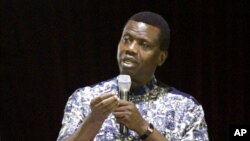ABUJA —
A prominent Nigerian pastor this week said gay marriage could wipe out the human race within 20 years. This comes as the Nigerian parliament sends a bill to President Goodluck Jonathan that would make gay marriage an offense punishable by up to 14 years in prison.
Pastor Enoch Adeboye heads the Redeemed Christian Church of God, a mega-church in Lagos, Nigeria's largest city. The church has 6,000 parishes around the world and the president of Nigeria attends his sermons.
Last weekend, the pastor weighed in on an issue that is barely controversial in Nigeria - gay marriage. He called gay marriage an “evil” and that, if it is allowed, no one will have babies and the human race will die out.
Right now, gay marriage is not recognized anywhere in Nigeria but it’s not a crime either-not yet anyway.
Late last year, the Nigerian parliament passed a bill that will make gay marriage, or ‘abetting or aiding’ gay marriage punishable by up to 14 years in prison. The lone voice of dissent among lawmakers said homosexuality is already a crime in Nigeria, so the bill is redundant.
“Same sex marriage cannot be allowed on moral and religious grounds. The Muslim religion forbids it. Christianity forbids it and the African traditional religion forbids it," said the bill's sponsor, Senator Domingo Obende.
The next stop for the bill is the president's office, where if signed, it becomes law. In the Nigerian media these days, politicians and preachers are clamoring for the bill. Off the record, local reporters say they dare not include gay-rights activists in the stories lest they be seen as ‘pro-gay,’ which can be dangerous in Nigeria.
Gay rights activists say the law will not just criminalize gay marriage, it will essentially outlaw organizations that provide services for gay people, including HIV/AIDS clinics.
At a conference honoring Martin Luther King Jr. in the northern city of Kaduna, U.S. ambassador to Nigeria Terence P. McCulley says the bill may not be in line with international human rights laws.
“We’re looking at it as a question of human rights," he said. "As a question of freedom of expression, freedom of association and questioning if all parts of the bill subscribe to international human rights conventions to which Nigeria is a party. And we’re worried about some elements, frankly, of the bill which could criminalize people who come together in associations to help people who have HIV and AIDS.”
At least twice, McCulley said U.S. policy towards Nigeria, or any country, is not conditioned on gay rights issues. But, he said, U.S. Secretary of State Hillary Clinton has “made if very clear” that supporting gay rights is an important part of American foreign policy.
Early this month, Nigerian Senate President David Mark said the law is “irrevocable.”
“There are many good values we can copy from other societies,” he said. “But certainly not this one.”
Ibrahima Yakubu contributed to this report from Kaduna
Pastor Enoch Adeboye heads the Redeemed Christian Church of God, a mega-church in Lagos, Nigeria's largest city. The church has 6,000 parishes around the world and the president of Nigeria attends his sermons.
Last weekend, the pastor weighed in on an issue that is barely controversial in Nigeria - gay marriage. He called gay marriage an “evil” and that, if it is allowed, no one will have babies and the human race will die out.
Right now, gay marriage is not recognized anywhere in Nigeria but it’s not a crime either-not yet anyway.
Late last year, the Nigerian parliament passed a bill that will make gay marriage, or ‘abetting or aiding’ gay marriage punishable by up to 14 years in prison. The lone voice of dissent among lawmakers said homosexuality is already a crime in Nigeria, so the bill is redundant.
“Same sex marriage cannot be allowed on moral and religious grounds. The Muslim religion forbids it. Christianity forbids it and the African traditional religion forbids it," said the bill's sponsor, Senator Domingo Obende.
The next stop for the bill is the president's office, where if signed, it becomes law. In the Nigerian media these days, politicians and preachers are clamoring for the bill. Off the record, local reporters say they dare not include gay-rights activists in the stories lest they be seen as ‘pro-gay,’ which can be dangerous in Nigeria.
Gay rights activists say the law will not just criminalize gay marriage, it will essentially outlaw organizations that provide services for gay people, including HIV/AIDS clinics.
At a conference honoring Martin Luther King Jr. in the northern city of Kaduna, U.S. ambassador to Nigeria Terence P. McCulley says the bill may not be in line with international human rights laws.
“We’re looking at it as a question of human rights," he said. "As a question of freedom of expression, freedom of association and questioning if all parts of the bill subscribe to international human rights conventions to which Nigeria is a party. And we’re worried about some elements, frankly, of the bill which could criminalize people who come together in associations to help people who have HIV and AIDS.”
At least twice, McCulley said U.S. policy towards Nigeria, or any country, is not conditioned on gay rights issues. But, he said, U.S. Secretary of State Hillary Clinton has “made if very clear” that supporting gay rights is an important part of American foreign policy.
Early this month, Nigerian Senate President David Mark said the law is “irrevocable.”
“There are many good values we can copy from other societies,” he said. “But certainly not this one.”
Ibrahima Yakubu contributed to this report from Kaduna





